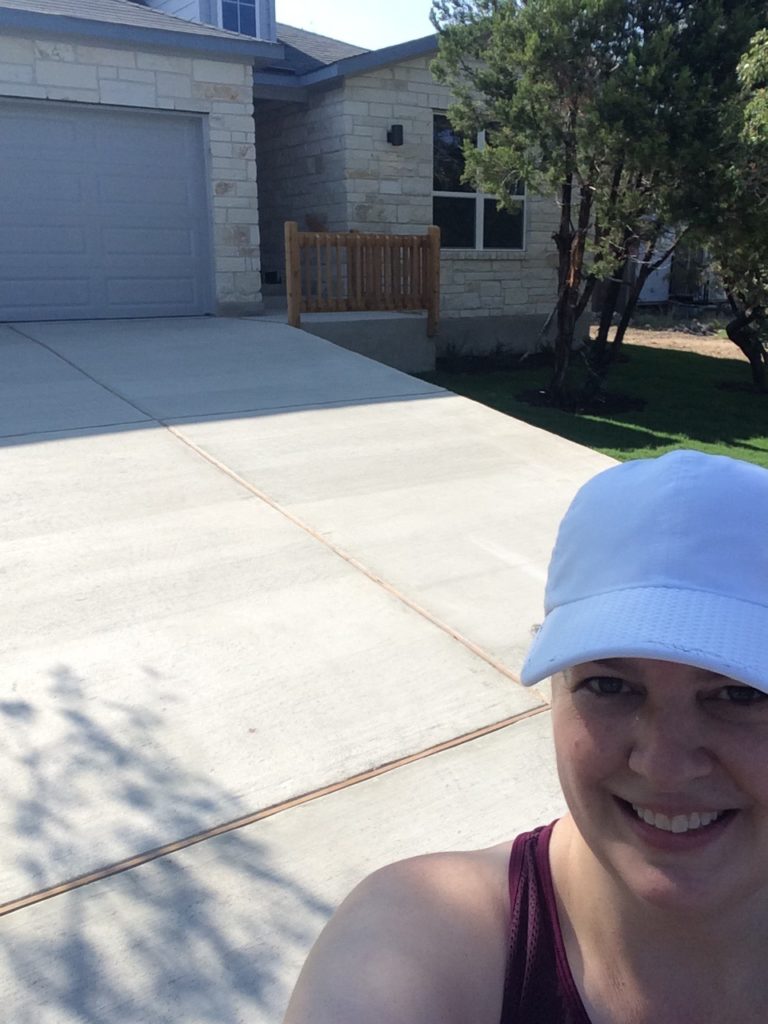Transitions: Momentarily Standing In The Neutral Zone

A selfie moment the day after the closing on my new home.
It’s happened at last. The dream has come true. One of my new neighbors stood at her mailbox applauding and calling out as we unloaded the moving truck, “Yay! Finally!”
By the way, I’ve moved many times in my life – in fact, 15 times that I can remember since childhood – and I’ve never had a neighbor ever do that before. But, of course, we all watched and waited for 6 months as my lot was cleared and my home was built. That she applauded my arrival totally makes sense!
What I’ve been reminded of during this experience is that it’s so easy to be caught up in the “doing” of a transition that we can forget to pause and truly experience what the transition is doing for us. There’s the change that’s happening on the surface, occupying our attention – in this case, the decisions, the packing, the unpacking. There’s also what’s happening underneath the surface.
It hit me the other day that this move to my new home is actually the final piece that completes a much larger 4-year transition. Moving to my new home is a long-held dream going back way more than 4 years. But 4 years ago is when I found myself suddenly divorced and living in an apartment with my adult daughter while we both rode the roller coaster of endings and beginnings. She’s moved on – literally and emotionally. I’ve moved on too. All is well and healed.
Like I said though, it’s easy to get swept up in the logistics of a transition. My clients seek me out to help them deal with career transitions, and our work together is all about what they should do next, about what actions they should take. So I’m extremely adept at the surface “doing” part of a transition.
But I also understand that sometimes transitions are manifestations of what our life needs. And sometimes they are the fruition of our conscious and unconscious intentions. Career transitions hold opportunities. All transitions hold opportunity. Fortunately, most of my clients come to understand this too. When they see what a transition can do for them in spite of the uncertainty and turmoil that disturbing the status quo causes, the “doing” part gets better results. Perhaps it’s because a sort of alignment to the inner wise self occurs. I know this is what it feels like for me.
William Bridges, an expert on transitions and author of several books on the subject, said that “Change is situational. Transition, on the other hand, is psychological. It is not those events, but rather the inner reorientation or self-redefinition that you have to go through in order to incorporate any of those changes into your life. Without a transition, a change is just a rearrangement of the furniture. Unless transition happens, the change won’t work, because it doesn’t take.”
He also claimed that transition consists of three phases: letting go of the past, the “neutral zone” where the past is gone but the new isn’t fully present, and making the new beginning.
Well, it’s clear that phase one is completely done for me. I’ve rearranged the furniture alright, and I’ve let go of the past as well. Right now, I’m standing momentarily in the “neutral zone” but won’t be there much longer. It’s time for phase three, and I have more dreams to make come true.
If you’re dealing with a transition, I encourage you to consider what phase you’re in and to simply pause and look at what’s happening underneath the surface too. :)
__________________________________________________________
Angela Loeb is into self-development & personal empowerment, being awed by nature, writing, and being inspired by superhero stories. She’s also a career expert who’s advised job seekers for more than two decades. More about Angela at http://angelaloeb.com.
__________________________________________________________



